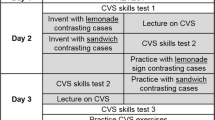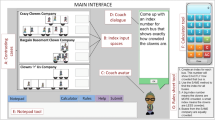Abstract
Invention activities are Productive Failure activities in which students attempt (and often fail) to invent methods that capture deep properties of a construct before being taught expert solutions. The current study evaluates the effect of scaffolding on the invention processes and outcomes, given that students are not expected to succeed in their inquiry and that all students receive subsequent instruction. While socio-cognitive theories of learning advocate for scaffolding in inquiry activities, reducing students’ agency, and possibly their failure rate, may be counter-productive in this context. Two Invention activities related to data analysis concepts were given to 87 undergraduate students in a first-year physics lab course using an interactive learning environment. Guided Invention students outperformed Unguided Invention students on measures of conceptual understanding of the structures of the constructs in an assessment two months after the learning period. There was no effect, however, on measures of procedural knowledge or conceptual understanding of the overall goals of the constructs. In addition, Guided Invention students were more likely to invent multiple methods during the Invention process. These results suggest that the domain-general scaffolding in Invention activities, when followed by instruction, can help students encode deep features of the domain and build on their failures during Productive Failure. These results further suggest not all failures are equally productive, and that some forms of support help students learn form their failed attempts.



Similar content being viewed by others
Notes
Pre-test differences between students who missed at least one activity and students who completed both activities for both conditions: t(128) = 0.59, p = .557; pre-test differences for the GI condition: t(63) = 1.672, p = .099; CDPA10973-differences for both conditions: t(128) = 0.84, p = .402; CDPA differences for GI students: t(63) = 0.17, p = .864.
References
Alfieri, L., Nokes-Malach, T. J., & Schunn, C. D. (2013). Learning through case comparisons: A meta-analytic review. Educational Psychologist, 48(2), 87–113. doi:10.1080/00461520.2013.775712.
Belenky, D. M., & Nokes-Malach, T. J. (2012). Motivation and transfer: The role of mastery-approach goals in preparation for future learning. Journal of the Learning Sciences, 21(3), 399–432. doi:10.1080/10508406.2011.651232.
Bjork, R. A. (1994). Memory and metamemory considerations in the training of human beings. In J. Metcalfe & A. P. Shimamura (Eds.), Metacognition: Knowing about knowing (pp. 185–205). Cambridge: The MIT Press.
Bulu, S., & Pedersen, S. (2010). Scaffolding middle school students’ content knowledge and ill-structured problem solving in a problem-based hypermedia learning environment. Educational Technology Research and Development, 58(5), 507–529. doi:10.1007/s11423-010-9150-9
Chi, M. T. H., De Leeuw, N., Chiu, M.-H., & Lavancher, C. (1994). Eliciting self-explanations improves understanding. Cognitive Science, 18(3), 439–477. doi:10.1016/0364-0213(94)90016-7.
Day, J., & Bonn, D. (2011). Development of the concise data processing assessment. Physical Review Special Topics, 7(1), 010114. doi:10.1103/PhysRevSTPER.7.010114.
Day, J., Nakahara, H., & Bonn, D. (2010). Teaching standard deviation by building from student invention. The Physics Teacher, 48(8), 546. doi:10.1119/1.3502511.
de Jong, T. (2006). Scaffolds for scientific discovery learning. In J. Elen, R. E. Clark, & J. Lowyck (Eds.), Handling complexity in learning environments: Theory and research (pp. 107–128). Howard House: Emerald Group Publishing.
Hmelo-Silver, C. E., Duncan, R. G., & Chinn, C. A. (2007). Scaffolding and achievement in problem-based and inquiry learning: A response to Kirschner, Sweller, and Clark (2006). Educational Psychologist, 42(2), 99–107. doi:10.1080/00461520701263368.
Holmes, N. G. (2011). The invention support environment: using metacognitive scaffolding and interactive learning environments to improve learning from invention. Circle: UBC’s Digital Repository: Electronic Theses and Dissertations (ETDs) 2008 + . http://hdl.handle.net/2429/37904.
Kapur, M. (2011). A further study of productive failure in mathematical problem solving: unpacking the design components. Instructional Science, 39(4), 561–579. doi:10.1007/s11251-010-9144-3.
Kapur, M. (2012). Productive failure in learning the concept of variance. Instructional Science, 40(4), 651–672. doi:10.1007/s11251-012-9209-6.
Kapur, M., & Bielaczyc, K. (2011). Classroom-based experiments in productive failure. In Proceedings of the 33rd annual conference of the cognitive science society (pp. 2812–2817).
Kapur, M., & Bielaczyc, K. (2012). Designing for productive failure. Journal of the Learning Sciences, 21(1), 45–83. doi:10.1080/10508406.2011.591717.
Kirschner, P. A., Sweller, J., & Clark, R. E. (2006). Why minimal guidance during instruction does not work: an analysis of the failure of constructivist, discovery, problem-based, experiential, and inquiry-based teaching. Educational Psychologist, 41(2), 75–86. doi:10.1207/s15326985ep4102_1.
Koedinger, K. R., & Aleven, V. (2007). Exploring the assistance dilemma in experiments with cognitive tutors. Educational Psychology Review, 19(3), 239–264. doi:10.1007/s10648-007-9049-0.
Loibl, K., & Rummel, N. (2013). The impact of guidance during problem-solving prior to instruction on students’ inventions and learning outcomes. Instructional Science, 1, 22. doi:10.1007/s11251-013-9282-5.
Manlove, S., Lazonder, A. W., & de Jong, T. (2007). Software scaffolds to promote regulation during scientific inquiry learning. Metacognition and Learning, 2(2–3), 141–155. doi:10.1007/s11409-007-9012-y.
Matlen, B. J., & Klahr, D. (2012). Sequential effects of high and low instructional guidance on children’s acquisition of experimentation skills: Is it all in the timing? Instructional Science, 41(3), 621–634. doi:10.1007/s11251-012-9248-z.
Rittle-Johnson, B., & Star, J. R. (2009). Compared with what? The effects of different comparisons on conceptual knowledge and procedural flexibility for equation solving. Journal of Educational Psychology, 101(3), 529–544. doi:10.1037/a0014224.
Roediger, H. L., & Karpicke, J. D. (2006). Test-enhanced learning taking memory tests improves long-term retention. Psychological Science, 17(3), 249–255. doi:10.1111/j.1467-9280.2006.01693.x.
Roll, I., Aleven, V., & Koedinger, K. R. (2009). Helping students know ‘further’-increasing the flexibility of students’ knowledge using symbolic invention tasks. In Proceedings of the 31st annual conference of the cognitive science society (pp. 1169–74).
Roll, I., Aleven, V., & Koedinger, K. R. (2010). The invention lab: Using a hybrid of model tracing and constraint- based modeling to offer intelligent support in inquiry environments. In V. Aleven, J. Kay, & J. Mostow (Eds.), Proceedings of the 10th international conference on intelligent tutoring systems (pp. 115–24). Berlin: Springer.
Roll, I., Aleven, V., & Koedinger, K. R. (2011a). Outcomes and mechanisms of transfer in Invention activities. In Proceedings of the 33rd annual conference of the cognitive science society (p. 2824–2829).
Roll, I., Aleven, V., McLaren, B. M., & Koedinger, K. R. (2011b). Improving students’ help-seeking skills using metacognitive feedback in an intelligent tutoring system. Learning and Instruction, 21(2), 267–280. doi:10.1016/j.learninstruc.2010.07.004.
Roll, I., Holmes, N., Day, J., & Bonn, D. (2012). Evaluating metacognitive scaffolding in guided invention activities. Instructional Science, 40(4), 691–710. doi:10.1007/s11251-012-9208-7.
Schwartz, D. L., & Bransford, J. D. (1998). A time for telling. Cognition and Instruction, 16(4), 475–5223. doi:10.1207/s1532690xci1604_4.
Schwartz, D. L., Chase, C. C., Oppezzo, M. A., & Chin, D. B. (2011). Practicing versus inventing with contrasting cases: The effects of telling first on learning and transfer. Journal of Educational Psychology, 103(4), 759–775. doi:10.1037/a0025140.
Schwartz, D. L., & Martin, T. (2004). Inventing to prepare for future learning: the hidden efficiency of encouraging original student production in statistics instruction. Cognition and Instruction, 22(2), 129–184. doi:10.1207/s1532690xci2202_1.
Schwartz, D. L., Sears, D., & Chang, J. (2007). Reconsidering prior knowledge. In M. C. Lovett & P. Shah (Eds.), Thinking with data (pp. 319–344). New York: Routledge.
Siegler, R. S. (2002). Microgenetic studies of self-explanation (pp. 31–58). Microdevelopment: Transition processes in development and learning.
Strand-Cary, M., & Klahr, D. (2008). Developing elementary science skills: Instructional effectiveness and path independence. Cognitive Development, 23(4), 488–511. doi:10.1016/j.cogdev.2008.09.005.
VanLehn, K. (1988). Toward a theory of impasse-driven learning. In D. H. Mandl & D. A. Lesgold (Eds.), Learning issues for intelligent tutoring systems (pp. 19–41). New York: Springer. http://link.springer.com/chapter/10.1007/978-1-4684-6350-7_2.
Westermann, K., & Rummel, N. (2012). Delaying instruction: Evidence from a study in a university relearning setting. Instructional Science, 40(4), 673–689. doi:10.1007/s11251-012-9207-8.
Wiedmann, M., Leach, R. C., Rummel, N., & Wiley, J. (2012). Does group composition affect learning by invention? Instructional Science, 40(4), 711–730. doi:10.1007/s11251-012-9204-y.
Wise, A. F., & O’Neill, K. (2009). Beyond more versus less: A reframing of the debate on instructional guidance. In T. Duffy & Tobias (Eds.), Constructivist instruction: success or failure.
Acknowledgments
This work was supported by the Pittsburgh Science of Learning Center, which is funded by the National Science Foundation, award number (#SBE-0836012), and by the University of British Columbia through the Carl Wieman Science Education Initiative.
Author information
Authors and Affiliations
Corresponding author
Electronic supplementary material
Below is the link to the electronic supplementary material.
Rights and permissions
About this article
Cite this article
Holmes, N.G., Day, J., Park, A.H.K. et al. Making the failure more productive: scaffolding the invention process to improve inquiry behaviors and outcomes in invention activities. Instr Sci 42, 523–538 (2014). https://doi.org/10.1007/s11251-013-9300-7
Received:
Accepted:
Published:
Issue Date:
DOI: https://doi.org/10.1007/s11251-013-9300-7




